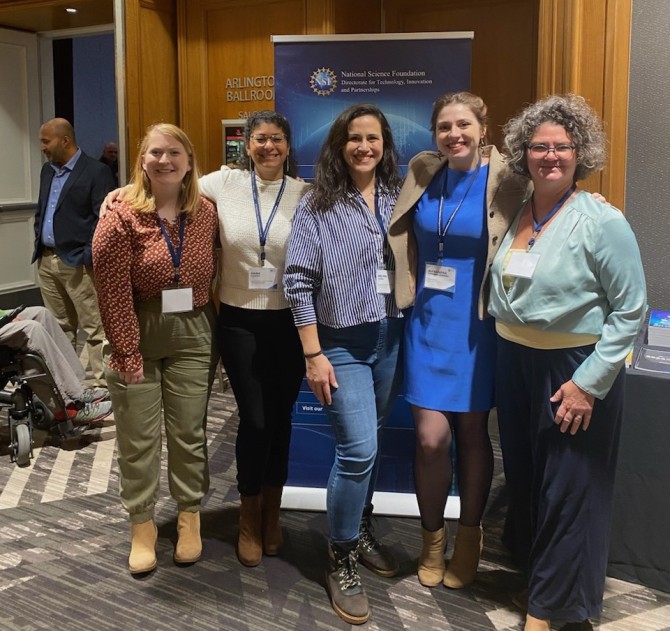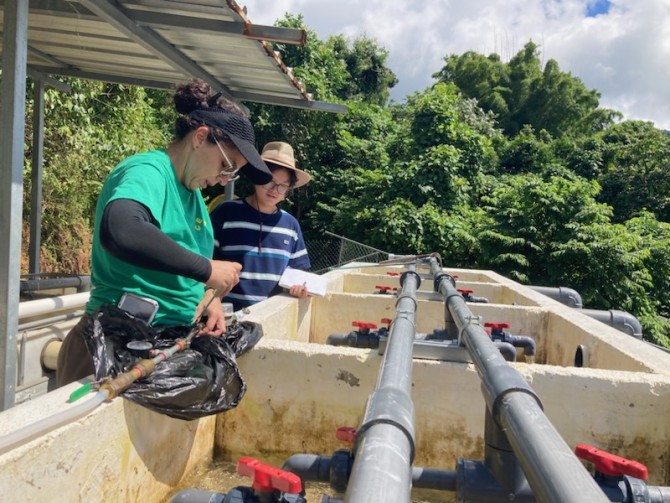Cornell Engineering is leading an initiative to help small communities in Puerto Rico finance, build and operate clean drinking water systems, with the goal of expanding the project to other U.S. locations.
Members of the Water for Small And Very Small Systems project attend a kickoff meeting hosted by the National Science Foundation in Washington, D.C. From left to right: Tess Clark, Kaira Fuentes and Melissa Young of Syracuse University's Center for Sustainable Community Solutions; and Alexandra Gearing and Ruth Richardson of Cornell Engineering.
The project, Water for Small And Very Small Systems (WaterSAVerS), is being funded by the U.S. National Science Foundation Convergence Accelerator program aimed at developing innovative technologies and solutions to improve U.S. freshwater systems.
Some communities are stuck in the middle between large cities that have government support for large mechanized centralized water systems and individual households that use point-of-use systems. Though centralized water treatment and distribution is beneficial to communities, they may lack resources to plan, design, operate and maintain a water treatment system.
The WaterSAVerS project - led by Ruth Richardson, associate professor of civil and environmental engineering - will focus on Puerto Rico, which has economic challenges as well as severe natural disaster risk, particularly in the face of climate change. The team's project will have three convergent focus areas to achieve the ultimate goal of a framework for rapid deployment of SaVerS water systems including governance and financing, community education and workforce training, and resilient water system technologies.
The project brings together diverse stakeholders and disciplinary experts. In addition to Richardson, the grant's coprincipal investigators represent Syracuse University's Center for Sustainable Community Solutions; the Interamerican University of Puerto Rico's Center for Environmental Education, Conservation and Research; and AguaClara Reach - a non-profit founded by Cornellians.
Melitza Crespo-Medina, associate professor at the Interamerican University of Puerto Rico, and Shaojinlin "Kim" Yang, Cornell graduate student in the Richardson Lab, testing water quality at a small community run drinking water system in rural Puerto Rico.
"For 20 years Cornell engineering faculty and students in the AguaClara Cornell program have been working on open-source sustainable water treatment technologies for small communities in the Global South," said Richardson, who is also the faculty advisor for AguaClara Cornell, a student project team that was the basis of AguaClara Reach. "The AguaClara technology aims to create gravity powered water treatment plants specifically for small and very small communities. Innovations in automated dosing, water movement and hydraulics create treatment plants that ease operation and maintenance demands since labor is a major cost for SaVerS."
An opportunity to deploy the AguaClara technology in Puerto Rico and other U.S. communities comes amid the Bipartisan Infrastructure Law, enacted in 2023 as part of the Infrastructure Investment and Jobs Act that authorized billions of dollars for federal investment, including significant financial support for water infrastructure in small communities. WaterSAVerS aims to support communities in accessing the funds.
"AguaClara plants already serve more than 100,000 persons in Central America and produce drinking water that consistently meets U.S. Environmental Protection Agency standards for turbidity and fecal indicator bacteria," Richardson said. "Migration of this technology into the U.S. could benefit millions of Americans living in SaVerS communities."
Patrick Gillespie is a communications specialist with Cornell Engineering.








